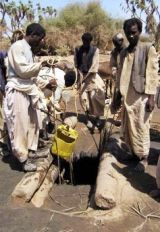Sudanese army attacks eastern rebels
Jan 11, 2006 (KHARTOUM) — Sudanese armed forces attacked eastern rebel areas early on Wednesday, a week before negotiations were expected to begin to resolve the protracted conflict, rebel officials said.

|
|
Beja people collect water in the rebel-controlled area of eastern Sudan, near the border with Eritrea June 4, 2005. (Reuters). |
Sudanese army officials could not immediately confirm the attack during the Muslim holiday week of Eid al-Adha, but one army source told Reuters there had been tension between the army and the eastern rebels in recent weeks.
“From the early morning the government troops attacked,” said Amna Dirar, secretary-general of the eastern Beja Congress political party.
A spokesman for the Eastern Front, which combines the two eastern rebel groups and their political parties, said the armed forces had not yet entered Hamesh Koreb, an area held by the rebels bordering Eritrea.
“Our people are defending their garrisons. The army haven’t entered Hamesh Koreb yet,” Ali el-Safi told Reuters, adding he he had no information on casualties as the fighting was ongoing.
Dirar said Libyan-mediated negotiations were due to start after January 17 and she could not understand why the Sudanese army had attacked now.
“For days now we knew the government was preparing something as many troops were there but we didn’t expect they would strike like that,” she said.
Despite a year-old peace deal between Khartoum and the Sudan People’s Liberation Movement (SPLM) that ended two decades of civil war in Sudan’s south, conflict simmers in the east and in the western region of Darfur.
Sudan’s government denies it unleashed surrogate militias that continue to terrorize southerners.The government is accused of unleashing a genocide to put down a rebellion in the western Darfur province, where at least 180,000 people have died and 1.5 million are displaced.
Aid agencies in Darfur are anxious to see peace hold in the south, where more than half a million refugees are expected to return this year. Many worry they will not stay if life in refugee camps proves better.
Low-level conflict
A think-tank warned last week that the low-level conflict in the east could escalate into full-blown war with disastrous results for civilians in the restive area.
The International Crisis Group said the SPLM’s planned withdrawal this month from eastern rebel-held areas, under the terms of the peace accord, could spark a deadly struggle for control of one of Sudan’s most important economic areas.
The Sudanese army source said while SPLM troops were withdrawing, tensions were increasing between the army and the eastern rebels, who had occupied the town of Hamesh Koreb in place of the former southern rebels.
“The problems are known between the army and the eastern rebels,” he said on condition of anonymity.
Like the insurgents in Darfur, the eastern rebels blame the central government in Khartoum for neglecting their area, which contains Sudan’s only port, the main oil pipeline carrying crude exports and Sudan’s largest gold mine.
Eastern Sudan’s low-level revolt escalated last year, when police fired on a peaceful march killing and injuring dozens of residents in Port Sudan. Rebels also kidnapped local politicians in an ambush in early 2005.
But the government and the rebels have since agreed to hold talks in Libya, after eastern rebels had finished training in negotiations skills.
(Reuters)
